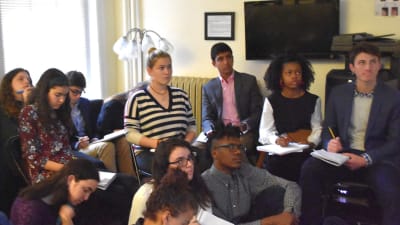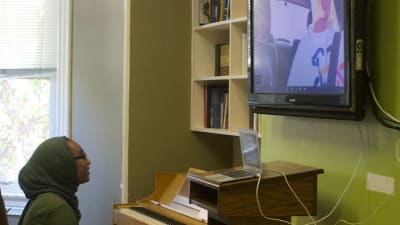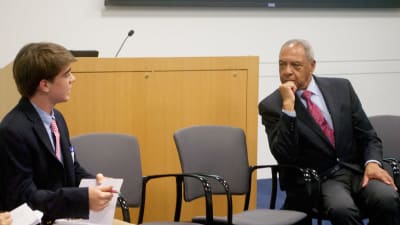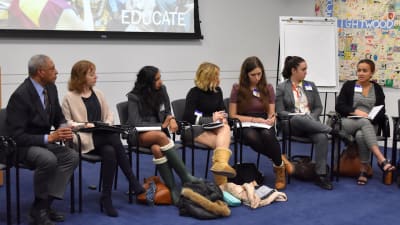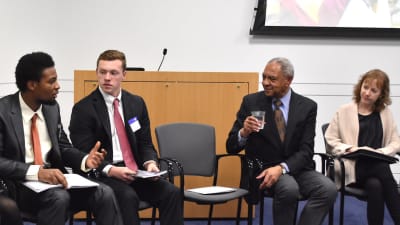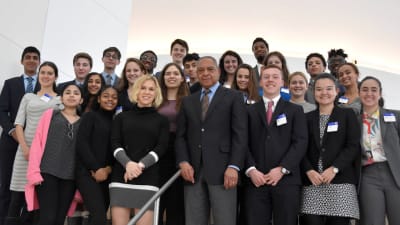Ghosts of Rwanda: Fall 2017 tackles genocide
Every SEGL graduate remembers “Ghosts of Rwanda Night.” Since our first semester, the powerful PBS Frontline documentary has served as an early turning point for our students. The film’s tragic story and graphic images provokes inspired soul searching. What is the best response to mass atrocities? Should American leaders always prioritize American interests, or is it worth risking American lives to help stave off tragedy abroad? How do we prevent such human rights abuses from ever occurring? Ghosts, and our second case study of the semester, poses these questions.
On Sunday evening we watched Ghosts together in our West dormitory common room. The discussion that followed was focused, sorrowful, and forward-looking. Many students continued their conversations on the front porch and in dorm rooms long into the night.
Three of the leaders featured in the documentary are longtime SEGL guest speakers, and we met with two of them this week.
Carl Wilkens is a former Adventist missionary who was the head of his church’s relief mission in Rwanda during the genocide. He was the only American to stay behind in 1994, and is most well-known for (among other acts) saving an entire orphanage from Interahamwe machetes. To SEGL graduates, he is a winner of our coveted “Golden Mug” award, which our graduates give to the speaker who has made the biggest difference in their lives. (Carl is also an honorary SEGL teacher; twice he has co-led a group of our students to Rwanda. To learn more about our 2015 trip–we may return this coming summer!–visit our SEGL in Rwanda page.)
Wilkens videoconferenced from his home in Spokane, Washington. He is the founder of World Outside My Shoes, a genocide prevention NGO that travels the country speaking to schools, universities, and others. The students asked him a range of questions–some personal, some political, some religious, some philosophical–and listened intently as he carefully and thoroughly addressed each one. (Not wanting to stop after an hour of conversation, but needing to get to a speaking engagement at a local school, Wilkens videoconferenced with our students in transit from his car, continuing for another half hour!)
On Thursday we walked to the United States Institute of Peace to hear from Ambassador George Moose. Moose was Assistant Secretary of State for African Affairs during the genocide. Moose helped students appreciate the bureaucratic decision making hurdles that stymied attempts to intervene. More important, he helped students see the legitimate reasons governments do not want to intervene in such conflicts.
(The third longtime SEGL guest speaker featured in the film is current UPS Vice President for Global Affairs Laura Lane. Although Lane no longer speaks publicly about her time in Rwanda, she gave a TED talk in 2015 that is very similar to the story she has told countless SEGL graduates. You can view that talk here.)
We decided to postpone our scheduled Friday trip to the Rwandan Embassy to discuss our maturing interactions with guest speakers. As a group, the students discussed ways to take better advantage of each expert session, and developed several recommendations that are sure to make this group maximize each SEGL learning opportunity. We hope to visit the Embassy very soon, to gain a Rwandan perspective (and perhaps even meet the ambassador!).
We rounded out the week with a Sunday visit to the U.S. Holocaust Memorial Museum, where students read, watched, listened, and reflected for several intense hours.
The week also brought several other highlights. For example, we enjoyed the first edition of our Books and Basketball community service project (more on that in a future post), our first student-led School Meeting, and a special student-led poetry slam on Friday night.
One other note from this week: on Wednesday morning, the students took part in an SEGL classic–the Leadership Styles exercise. With two questions (“Is your first instinct to observe or speak when in a group making a decision?” “When you make important decisions, do you decide with your head or your heart?”) the students divided themselves up into four basic leadership styles: Driver, Expressive, Analyst, and Supportive. Each group completed the same given task, but ended up with very different results; the ensuing conversation revealed, among other insights, the importance of having each style reflected in any decision making group (or, perhaps, in any decision making leader!).
Our Israeli-Palestinian case study is next!
